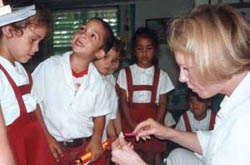Getting a Reading on High Literacy in Cuba
Cuba is fascinating for its clear educational successes in the midst of socioeconomic difficulties.
It’s a question Kate Moody (Ed.D., 1993; Ed.M., 1991) has pondered for years: Why does Cuba , a relatively poor country burdened with an embargo for the past 50 years, enjoy a literacy rate among the highest in the world—higher than that of the United States
“Not only does Cuba Cuba has been sealed off from trade and most tourism by U.S.
Moody, who is writing a book about education in Cuba del Rio , with a retired Cuban physics professor as her mentor) and interviewed scores of teachers and students, as well as some of the pioneers of Cuba
Her research is still a work in progress, but some images are taking shape. Expectations for students are high. Curricular material is rigorous and challenging— for instance, all high school students take chemistry and physics. Quality education is free to all students, beginning with the circulo (infant day care centers) and continuing through college and even medical school. And the concept of “work-study” is evidenced throughout.
“Students are expected to do some kind of meaningful work while they’re students, and as they enter the workplace, they’re also expected to keep on learning,” Moody says. “Cuba
Moody says her next Cuba trip, after hurricane season has passed, will be to the city of Santa Clara Havana
Published Tuesday, Dec. 22, 2009
